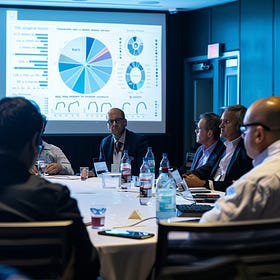Haere mai/welcome to May! My apologies for delivering this update slightly later this month - I know you have been hanging on the edge of your seat waiting for it! After being unexpectedly struck down with pneumonia, I’ve been in no fit state to write anything.
I hope everyone is coping with the increasingly wild weather battering Aotearoa in the last few weeks - quite aside from all the other comings and goings in the health and safety landscape, that has been enough to keep us busy!
As ever, a quick plug before the newsletter proper begins. I undertake this mahi on top of my paid work (and unpaid work as a dad of 4!) and my goal is to keep it free and open access for as long as possible. I would greatly appreciate it if you can share this resource among your professional networks, encourage those you know to subscribe, and - of course - like and comment on posts.
This month:
News
The end of this week sees an important date in the calendar of workplace health and safety events: Pink Shirt Day. This annual event - taking place on Friday, May 16 - seeks to raise awareness of bullying and its effects, while sharing resources for standing and speaking up, eliminating bullying, and promoting kindness and inclusion.
Spotlight on Workplace Bullying
The Mental Health Foundation’s annual Pink Shirt Day appeal - an event focused on raising awareness of bullying in all its forms and contexts - is set to take place later this week; it serves as a timely reminder for understanding workplace bullying.
You can access resources and information on how you can get involved via the official Pink Shirt Day website.
More reading:
Last week, under urgency, the government in Aotearoa pushed through legislative changes to pay equity. The Pay Equity Amendment Act introduces several changes including raising the threshold for proving a sex-based pay gap and cancelling 33 claims currently underway via the former process. The government suggests these changes seek to simplify the process and return pay equity claims to the original intent of the 2017 legislation, making the legislation “workable”. Opponents, however, hold the view the changes are an attack on women and are a slap in the face of the 150,000 workers whose claims have been abruptly halted.
From a health and safety perspective, this is important on several levels. As we’ve talked about before, under current legislation, ensuring workers have access to mentally healthy work is a key obligation of businesses in Aotearoa. While mentally healthy work is a multi-faceted concept, important components include (but are not limited to):
providing employees with adequate/appropriate remuneration for work undertaken
ensuring there are appropriate formal reward and recognition processes in place; and
considering how “fairly a workplace treats its workers, particularly in how applies its policies and procedures… and makes decisions about allocation of work and resources.”1
The gender pay gap evident in an alarming number of industries has wide-ranging ramifications. Chief among these is the risk it presents to the health, safety, and well-being of ngā kaimahi wahine; businesses and industries would do well to consider this risk.
This week (12-18 May) is Road Safety Week, an annual event that seeks to encourage people to observe safe driving practices, raise awareness about the impact of road accidents, and promote initiatives to make roads safer. This year’s theme is “Be a road safety hero”, recognising the mahi of those who work to make our roads safe and encouraging ways we can all get involved.
According to the Ministry of Transport, in 2023, there were 2,794 deaths and serious injuries on our roads while data from WorkSafe indicates there were 30 fatalities related to vehicle incidents during July 2022-June 2023.
Importantly, road safety extends beyond driving at work to on-site vehicle safety, pedestrians, and passengers.
Important reading and resources:
Road safety resources (general)
Recently, our national regulator - WorkSafe - quietly released its good practice guidelines on Managing Psychosocial Risks at Work. These new guidelines include information on:
what are psychosocial hazards and risks, including examples of risks and ‘protective factors’
identifying and assessing risks and hazards
managing psychosocial risks
monitoring and reviewing control measures
actions to take when psychosocial risks cannot be eliminated or minimised
supporting resources and information sources; and
supporting information (e.g., worker engagement).
In other news…
A Wellington roof cleaning business was fined for failing to ensure the health and safety of one of its employees after the 38-year-old fell six metres from a slippery rooftop.
The Easter break saw two workplace fatalities when two farmers died while using vehicles on their respective farm.
WorkSafe has partnered with a Rotorua factory to introduce AI-driven hazard detection at a wood processing factory.
The finalists for the 2025 NZ Workplace Health & Safety Awards have been announced.
Adventure activity operators and outdoor recreation providers can now access new guidelines on managing risks from natural hazards (e.g., flooding, landslips, and snowfall).
Resources
Here’s a roundup of tips and resources you might find useful at work…
While it’s been released to little fanfare, it’s great to see the release of WorkSafe’s guidance on managing psychosocial risks at work. A key component - which research indicates underpins psychosocial hazard and risk management - is the psychosocial safety climate or PSC. This is a key construct that reflects the value an organisation places on protecting workers from psychological harm. Given its importance as a ‘cause of causes’, it’s vital that businesses understand it.
On LinkedIn, Umbrella Wellbeing published a post exploring the Six-S principles of inclusive leadership. While targeted at supporting neurodivergent workers, leaders who adopt the principles will positively support all workers.
Following the release of its Guide to Connecting with Nature, the Mental Health Foundation has published tips on improving our physical well-being. While the benefits of physical activity to our overall health and well-being are well established, including it in our daily life can be daunting. This guide aims to help overcome some of the barriers to increasing physical activity.
The New Zealand Council of Trade Unions has released a new resource that provides guidance on adopting artificial intelligence at work. Alongside exploring other facets of introducing AI in the workplace, the NZCTU adopts a health and safety lens, reinforcing the need for robust engagement with, and representation of, workers.
In her review of her ‘biggest leadership mistakes from 2024’, Inventium’s Amantha Imber highlighted the importance of psychological safety.
My biggest culture lesson from 2024 was about psychological safety - it must be universal, not just widespread. In smaller teams especially, when even one person doesn't feel safe to speak up, the entire system breaks down.
The pattern is clear: Without complete psychological safety, genuine concerns move from open forums to private conversations. Issues fester beneath the surface. Team members develop separate realities - what's said in meetings versus what's discussed afterward. Innovative ideas remain unspoken.
Research
Here’s some research that caught my eye in the last few weeks:
Researchers in the UK and Spain have shown that workers’ experience of bullying negatively affects sleep. With the effects increasing over time, those affected by bullying wake up too early, are dissatisfied with their sleep, and find their poor sleep interferes with their daily lives. The study also showed a degree of contagion, with bullying victims’ sleep issues influencing or affecting their partners’ sleep.
Japanese scholars have reinforced the importance of taking breaks from sitting at work. The quasi-experimental study showed that taking a 10-minute break every hour resulted in a 24.4-minute increase in physical activity each day, without the need for sit-stand desks or similar tools. However, the study showed evidence of increased psychological distress and reduced engagement with work for those in the intervention group.
A literature review undertaken by researchers from the Center of Excellence in Risk and Decision Sciences in Cyprus looked at the role and impact of ICT on workplace health and safety. While research is limited, the authors highlighted a number of benefits (e.g., improved data collection), new technologies introduce new risks in the form of information overload and increased stress.
A 2023 study from Australia examined the role of business’ response to complaints of workplace incivility in workers’ withdrawal from and satisfaction with work. The authors highlighted the role of gender and cultural differences in this relationship, noting the need for multi-dimensional interventions that go beyond workplace policies targeting workplace incivility.
The latest issue of the New Zealand Journal of Health and Safety Practice has been published.
If you’ve encountered research you’d like to share with other readers, please add details in the comments!
Events
If you’re looking for professional development opportunities here are some upcoming events.
May
15 - Psychosocial Risk Assessment: Move Beyond Box Ticking to Effective Practice, 1-2pm, online (FlourishDx).
16 - Pink Shirt Day, annual awareness event.
21 - Mitigating Unconscious Bias in the Employee Life Cycle, 9.30-11.30am, online (Diversity Works).
22 - Public Sector Early in Careers Health and Safety Certificate, 1-4pm, online, (GHSL).
26-28 - NZOHS Work Related Health Conference, Auckland.
27 - From Incivility to Inclusion, 9.30-11.30am, online (Diversity Works).
28 - Inclusion through Uncertainty and Transition, 2-3pm, online (Diversity Works).
June
4 - Using Work Design in Psychosocial Risk Management, 11.00am-3.00pm, online, (Heart and Brain Works).
4 - Improving Cultural Intelligence, 9.30-11.30am, online (Diversity Works).
5 - Government Health and Safety Lead’s H&S Rep Conference, 9.45am-4.30pm, Wellington.
10 - Building a Proactive Safety Culture, 4.30-6.30pm, online livestream (EMA).
11 - Inclusive Leadership, 9.00am-12.00pm, online workshop (Diversity Works).
12 - Psychological Safety Senior Leader Forum, 9.00am-12.00pm, Princes Wharf, Auckland (Business Leaders’ Health and Safety Forum).
16-18 - Safeguard National Health and Safety Conference, Viaduct Events Centre, Auckland (Safeguard).
17 - NZ Workplace Health and Safety Awards Gala dinner, Viaduct Events Centre, Auckland.
24 - Psychosocial Risk Management Made Simple, 11.00am-3.00pm, online (Heart and Brain Works).
25 - Creating Cultures of Respect, 9.30-11.30am, online workshop (Diversity Works).
July
17 - The Manager’s Toolkit: Psychosocial Risk Management, 11.00am-3.00pm, online (Heart and Brain Works).
30 - Due Diligence Series (5/6), 12.30-1.30pm, online webinar (NZSIM).
31 - Effective Health and Safety Incident and Investigation Methods, 9.00am-4.00pm, Tauranga (EMA).
Thanks very much for checking out this month’s newsletter; if you have suggestions for more content or you’d like to reach out, please get in touch or engage in the discussion online.
Until next month, be well, be safe, and take care; noho ora mai.
Matt
GHSL (2021, p.5). Creating Mentally Healthy Work and Workplaces.





